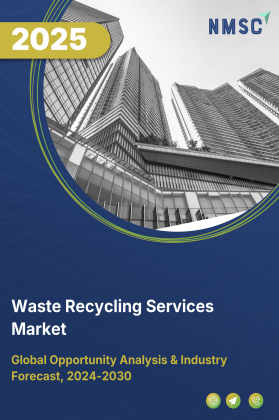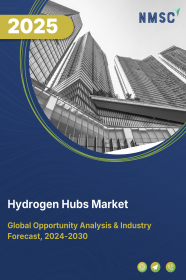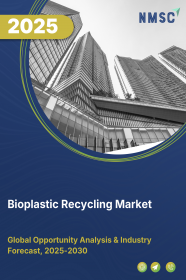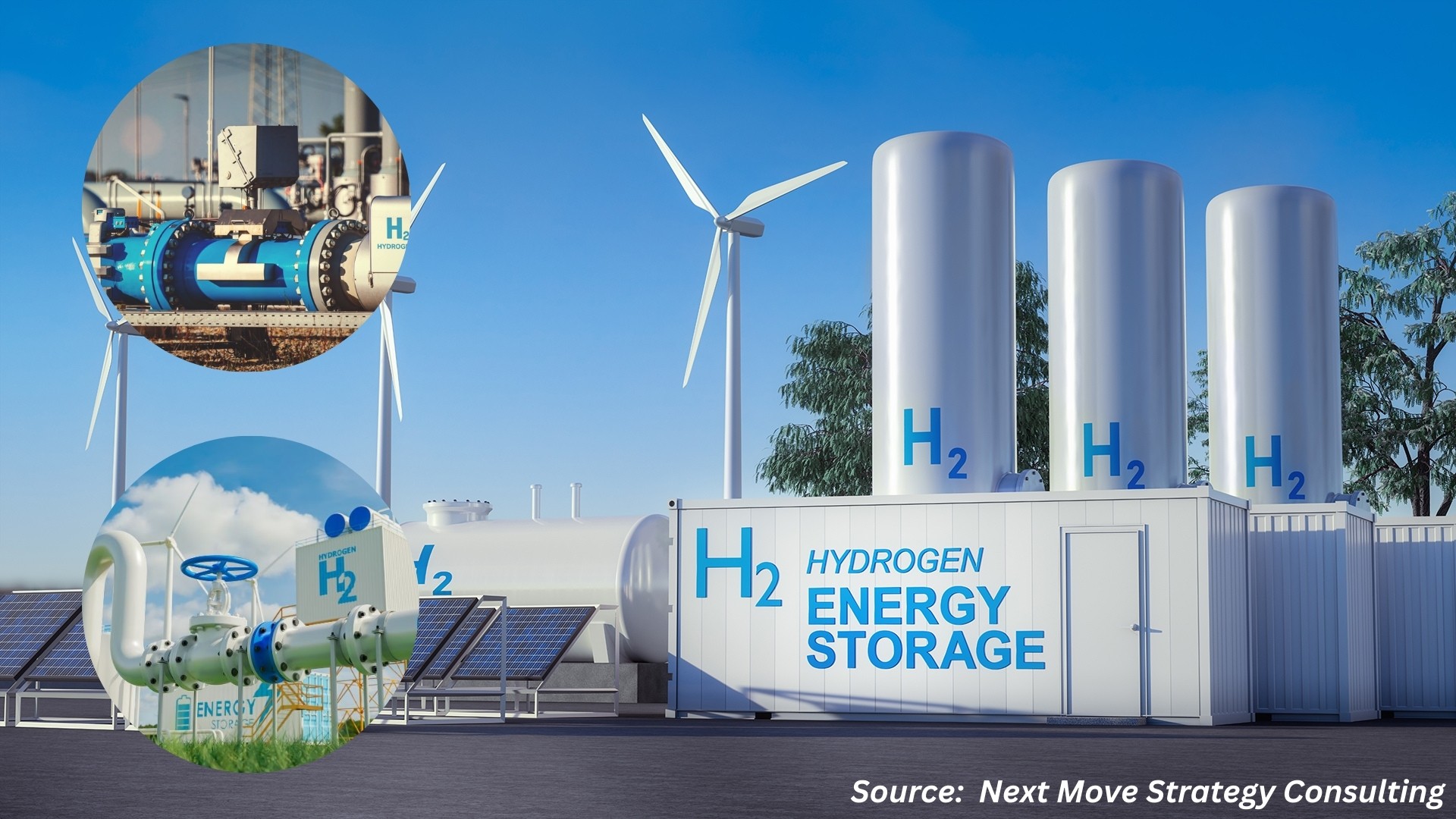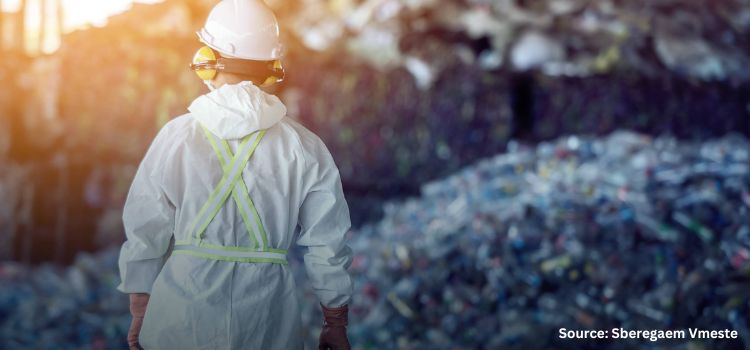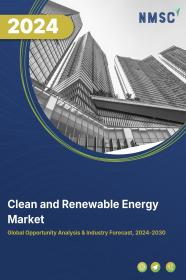
Clean and Renewable Energy Market by Type (Hydroelectric Power, Wind Power, Bioenergy, Solar Energy, Geothermal Energy, and Others), by Application (Power Generation, Heating/Cooling, Transportation, Rural Electrification, Desalination, and Others), and by End-use (Residential, Commercial, Industrial, and Others) - Global Opportunity Analysis and Industry Forecast 2024-2030
Market Definition
The Clean and Renewable Energy Market was valued at USD 4709.95 billion in 2023 and is predicted to reach USD 13542.04 billion by 2030 with a CAGR of 16.2% from 2024-2030. Renewable energy is often referred to as clean energy or sustainable energy that comes from natural sources that have a low carbon footprint. The energy generated by natural sources is constantly restored and replenished. The use of clean and renewable energy does not pollute the atmosphere and reduces soil, air, and water pollution. Global businesses and industries are now moving towards renewable energy to attain lower energy costs, improve eco-friendliness, and decrease their dependency on fossil fuels.
Market Dynamics and Trends
The increasing demand for solar photovoltaic, wind turbines, micro wind technology, heat pumps, biomass boilers, and other renewable energy generators is driving the growth of clean and renewable energy market. Also, with the rising concerns related to climate change including amplified carbon footprint and global warming, several governments of developed and developing economies are taking various initiatives to shift towards clean and green energy production.
According to the United States Environmental Protection Agency, the US government launched the National Action Plan for Energy Efficiency, a private-public initiative facilitated by EPA and the US Department of Energy to create a sustainable, aggressive national commitment to energy efficiency by 2025. The favorable policies and subsidies from governments boost the clean and renewable energy market. Furthermore, the development of industrial sectors such as retail, healthcare, manufacturing industries, e-commerce, and others are significantly increasing the energy demands, which will further foster the growth of the clean and renewable energy market.
However, the huge investment cost of building, installation & maintenance, along with the lack of technical expertise are the factors that may restrain the growth of the market during the forecasted period. On the contrary, the rising demand for energy consumption coupled with increasing investments by public and private sectors to diversify the range of energy sources is expected to create ample of opportunities for clean and renewable energy market in the projected period.
Market Segmentations and Scope of the Study
Clean and renewable energy market is segmented on the basis of type, application, end-use, and geography. On the basis of type, the market is divided into hydroelectric power, wind power, bioenergy, solar energy, geothermal energy, and others. On the basis of application, the market is divided into power generation, heating/cooling, transportation, rural electrification, desalination, and others. On the basis of end-use, the market is divided into residential, commercial, and industrial. The industrial market is further divided into power, chemicals & petrochemicals, oil & gas, and food & beverage. Geographic breakdown and analysis of each of the aforesaid segments include regions comprising North America, Europe, Asia-Pacific, and RoW.
Geographical Analysis
Asia-Pacific held the leading position in clean and renewable energy market in 2021 and is anticipated to maintain its dominance during the forecast period. This is attributed to factors such as increasing investments by governments in clean and renewable energy production.
Also, industrialization in healthcare, retail, e-commerce, manufacturing firms, and other industries being set up in this region is likely to boost the renewable energy market. China is planning to produce about 33% of its total power consumption to provide the required electricity demand in its region from renewable sources by 2025 to support its total renewable energy requirement, which is set to reach about 1 billion. For instance, in June 2021, China completed the mega hydropower project Wudongde hydropower station. The power plant is expected to generate 39 billion kilowatt-hours of electricity a year.
Moreover, in February 2022, the governments of Australia and India joined forces on the development of a new renewable energy technology project. The project was aimed at reducing the cost of installation and scaling up their deployment in order to accelerate renewable energy production along with the reduction in global emissions.
Furthermore, the presence of major players such as Jinko Solar Holding Co., Tata Power Company Limited, ABB Xcel Energy Inc., EDF National Grid Renewables, Acciona Enel Spa Innergex, and others boosts the market growth in this region. In October 2022, JinkoSolar Holding Co. Ltd. launched a 182 mm high-efficiency N-type monocrystalline silicon solar photovoltaic cell with excellent electrical and optical performance at low cost and with high durability.
North America is expected to exhibit a steady rise in the clean and renewable energy market during the forecast period due to the rising electricity demand and government policies regarding clean fuel standards and biofuel production.
In addition, to reduce greenhouse emissions and to diversify energy sources, countries including U.S. and Canada have joined forces. For instance, in October 2022, the governments of the United States and India announced the launch of a new collaborated energy task force to assist the large-scale integration of renewable energy that is needed to strengthen energy security and accelerate clean, secure, and seamless energy transition.
Furthermore, In May 2022, the government of Canada completed the clean and renewable energy megaproject named Keeyask Hydropower Plant. The project consists of a seven-unit powerhouse energy generating station that will add approximately 4,400 gigawatt-hours of renewable electricity per year to Manitoba Hydro’s total supply.
Also, in April 2021, Sol Systems entered into a partnership with Walmart for the installation of 6.5 MW of rooftop and canopy parking solar systems across multiple Walmart stores in California. The project was executed as part of a. This initiative aims to increase renewable energy generation and reduce carbon emissions, furthering Walmart's commitment to sustainability and clean energy solutions.
Competitive Landscape
Various market players operating in clean and renewable energy market include NextEra Energy, Inc., Iberdrola, S.A., General Electric Company, Siemens Gamesa Renewable Energy, S.A.U., Brookfield Asset Management, Algonquin Power & Utilities Corp, Plug Power Inc., Canadian Solar Inc., Daqo New Energy Corp, Vestas Wind Systems, and others. These market players are adopting various strategies such as collaborations, acquisitions, and business expansion across various regions to maintain their dominance in the clean and renewable energy market.
For instance, in September 2022, JinkoSolar signed an agreement with Aldo Solar for the distribution of 600 MW of N-type Tiger Pro modules. The partnership aims to meet the increasing demand for high-efficiency solar modules in markets worldwide, providing customers with reliable and advanced solar solutions.
Moreover, in May 2022, JinkoSolar Holding Co. Ltd signed a new distribution agreement with Aldo Electronic Components to launch the new N-Type ultra-efficiency photovoltaic Tiger Neo modules. The new Tiger Neo modules technology further enhances the performance, power, energy density, and reliability as compared to conventional modules.
Furthermore, in May 2021, Siemens Gamesa supplied the largest wind farm order to supply, install, and commission 32 onshore turbines for the largest wind farm in the Philippines.
Key Benefits
-
Clean and renewable energy market report provides a quantitative analysis of the current market and estimations through 2022-2030 that assists in identifying the prevailing market opportunities to capitalize on.
-
The study comprises a deep dive analysis of the clean and renewable energy market trend including the current and future trends for depicting the prevalent investment pockets in the market.
-
The information related to key drivers, restraints, and opportunities and their impact on the clean and renewable energy market is provided in the report.
-
The competitive analysis of the market players along with their market share in the clean and renewable energy market.
-
The SWOT analysis and Porter’s Five Forces model are elaborated in the study.
-
Value chain analysis in the market study provides a clear picture of the stakeholders’ roles.
Key Market Segments
By Type
-
Hydroelectric Power
-
Wind Power
-
Bio Energy
-
Solar Energy
-
Geothermal Energy
-
Others
By Application
-
Power Generation
-
Heating/Cooling
-
Transportation
-
Rural Electrification
-
Desalination
-
Others
By End-Use
-
Residential
-
Commercial
-
Industrial
-
Power
-
Chemicals & Petrochemicals
-
Oil & Gas
-
Food & Beverage
-
-
Others
By Geography
-
North America
-
U.S
-
Canada
-
Mexico
-
-
Europe
-
Germany
-
France
-
Italy
-
Spain
-
United Kingdom
-
Russia
-
Sweden
-
Rest of Europe
-
-
Asia-Pacific
-
Australia
-
China
-
India
-
Japan
-
South Korea
-
Indonesia
-
Singapore
-
Rest of Asia-Pacific
-
-
RoW
-
UAE
-
Brazil
-
South Africa
-
Israel
-
KSA (Kingdom of Saudi Arabia)
-
Turkey
-
Remaining Countries
-
Key Market Players
-
NextEra Energy, Inc.
-
Iberdrola, S.A.
-
General Electric Company
-
Siemens Gamesa Renewable Energy, S.A.U.
-
Brookfield Asset Management
-
Algonquin Power & Utilities Corp
-
Plug Power Inc.
-
Canadian Solar Inc.
-
Daqo New Energy Corp
-
Vestas Wind Systems

















 Speak to Our Analyst
Speak to Our Analyst



